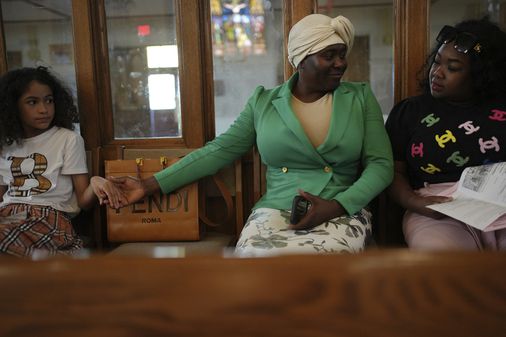When I was growing up in the predominately white suburb of Wellesley, my Haitian immigrant parents took every opportunity to teach me and my three older sisters about Haiti. They armed us with the history of Haitians’ trailblazing fight for independence, regaled us with the folklore of our culture, immersed us in the vibrant Kreyòl (Haitian-Creole) language, and instructed us to venerate what Haitians refer to as lekol, legliz, lakay: education, church, and home. They also demonstrated what it looks like to stand for Haiti and Haitians through local organizing and community engagement. What I did not realize but see so clearly now is that their efforts were also a form of resistance against false narratives about Haiti.
Haitians have always resisted. Both in Haiti and in the diaspora.
A recent example was a gathering of local Haitians I attended in the basement of Mattapan’s Mount Carmel church. We were there to organize a response to the Republican presidential campaign’s role in amplifying the most recent insult against Haitians: that new arrivals in Springfield, Ohio, were eating their neighbors’ pets, a bizarre and thoroughly debunked claim. By fanning the flames of racist hate, the Trump-Vance team has put thousands of Haitians at risk. Yet as many have pointed out, to Haitians none of this is new. Each time our response has been the same. As one local Haitian leader declared at the Mattapan meeting: fo nou kanpe. We are Haitians, we must stand.
Members and supporters of the Haitian community rallied outside Our Lady of Mount Carmel church in Mattapan on Oct. 3, 2021, to demand that the Biden administration stop deporting Haitians. Gretchen Ertl for The Boston Globe
As long ago as 1990, the Centers for Disease Control and Prevention lumped together “Haitians, homosexuals, hypodermic-needle users, and hemophiliacs” into what came to be known as the “4H” high-risk group for AIDS. In response, tens of thousands of people shut down traffic over the Brooklyn Bridge to stand against the racist and xenophobic treatment of Haitians.
This past week, marches resembling that and other demonstrations from the past three decades took place near the Nassau Veterans Memorial Coliseum on Long Island, N.Y. Here in Boston, at noon this Tuesday there will be a march to show solidarity with the Haitian community at the Embrace monument on Boston Common.
In Milton, where I live, members of the community, including local Haitians, Haitian-Americans, and many others, together with churches in the area, have formed the Milton Welcoming Haitian Newcomers group to raise funds and help new arrivals figure out housing, work authorization, and education for their children. Geralde Gabeau, a well-respected leader in Boston’s Haitian community and the Immigrant Family Services International’s tireless executive director, was instrumental in establishing the group. Another local example of hospitality and solidarity is the magnanimous Pastor Dieufort “Keke” Fleurissant, who has helped Haitian newcomers with finding everything from translators to jobs.
We witnessed similar efforts in Ohio when Springfield residents flocked to Haitian restaurants to show their support for the community and reject the insidious lies Donald Trump continues to spread. Amid the misinformation, negativity, and distractions about Haitians, it is important that we Americans reject the falsehoods and remember what we can be: a nation that welcomes people with hospitality and kindness, just as some are doing in Milton, in Springfield, and many other places.
Not long after the 2010 earthquake that devastated parts of Port-au-Prince and surrounding areas, the Haitian feminist anthropologist and artist Gina Athéna Ulysse proclaimed that “Haiti needs new narratives.” Ulysse was not referring to how Haitians see themselves but rather to how outsiders stereotype Haiti. If one were to look more closely, one would see something very different from what the international media tends to report about the country. You might see our rich history and dynamic culture, or our brilliant people and distinct traditions. As one of us, the feminist writer Roxane Gay, has written, for some people of Haitian descent, “there is something bittersweet in being part of the diaspora of a proud and beautifully complex country like Haiti — to be born and raised in America, but to take fierce pride in where I come from.”
Haitian journalist and filmmaker Etant Dupain has given us just the kind of new narrative that Ulysse has called for with his latest film, “Batay Pou Ayiti,” or “The Fight for Haiti” in English, which will premiere in the United States on Northeastern University’s Boston campus on Thursday. The film chronicles the advocacy of the Kot Kòb Petrocaribe movement, a grassroots effort that began in 2018 to demand government transparency and accountability from Haitian leaders. Dupain’s film showcases a generation of young activists for justice who are hopeful they can create change in today’s Haiti.
As Harvard professor and author Imani Perry once wrote, “Racism is terrible, Blackness is not.” And neither is being Haitian. It is racism and xenophobia that are terrible. This latest attack on the Haitian community is a reminder that we must continue to mobilize and stand with those who are most victimized. Fo nou kanpe.
Régine Michelle Jean-Charles is dean’s professor of culture and social justice and director of Africana studies at Northeastern University.
Source link : http://www.bing.com/news/apiclick.aspx?ref=FexRss&aid=&tid=66efc45174d149c589de8e177da911ac&url=https%3A%2F%2Fwww.bostonglobe.com%2F2024%2F09%2F22%2Fopinion%2Fhaiti-combat-trump-racist-lies%2F&c=2788284666282554233&mkt=en-us
Author :
Publish date : 2024-09-21 20:00:00
Copyright for syndicated content belongs to the linked Source.
